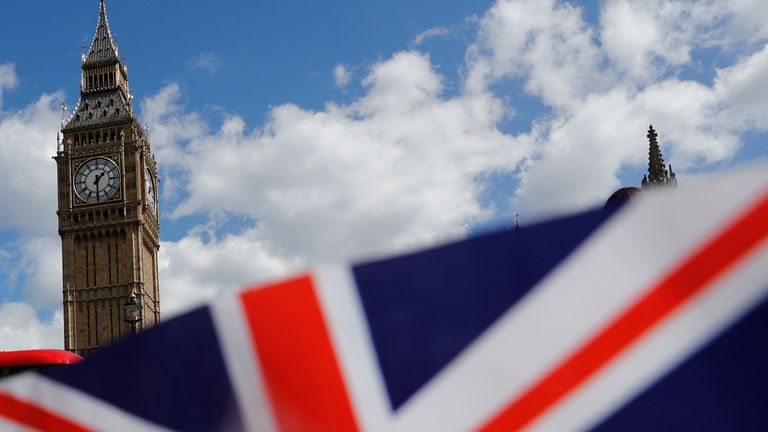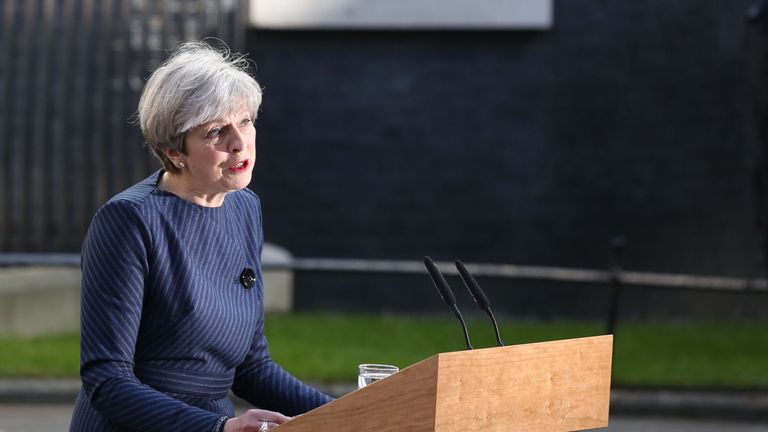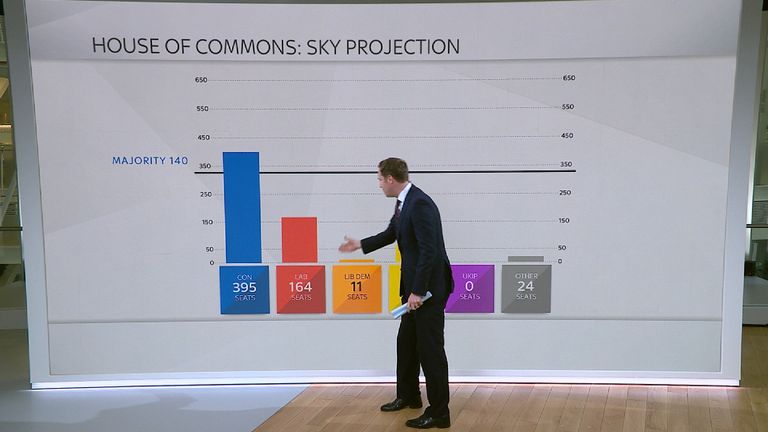The key questions posed by Theresa May's call for a snap election
Sky News takes a look at how the possible General Election would be organised and what it could mean for the parties involved.
Wednesday 19 April 2017 04:28, UK
Theresa May stunned the country as she announced her intention to hold a General Election on 8 June.
As Britons prepare to go to the polls for the second time in just over two years, Sky News takes a look at the key questions posed by .
:: What would the process be?
Firstly, it is important to remember the Prime Minister has not called an election, but has signalled her intention to hold one.
Under the Fixed-Term Parliaments Act, introduced under the last coalition government, the next election was not due until 2020.
However, Mrs May is able to call an election before then if it is backed by two-thirds of MPs or if there is a no confidence vote in the Government.
On Wednesday, the Prime Minister will attempt to meet the former requirement with a vote in the House of Commons.
If Mrs May is successful, Britain will go to the polls on 8 June.
Under this timescale, Parliament would be dissolved on 3 May. Eight days later would come the deadline for nomination papers from candidates.
Meanwhile, the deadline to register to vote would be on 22 May, with the deadline to apply for a postal vote coming the following day.
:: What about the other planned elections?
Just four days before Mrs May's planned election, voters are set to go to the polls for local elections and the Manchester Gorton by-election.
The former will go ahead as planned - only overworked returning officers and vote counters will be impacted.
However, as of yet it is unclear what will happen with the by-election to succeed late Labour MP Gerald Kaufman.
While it is strongly expected to be called off, as things stand it is still going ahead.
Joanne Roney, returning officer for Manchester, told Sky News she is "seeking advice" from the Government and the Electoral Commission and will confirm arrangements "as soon as possible".
Earlier, Commons Leader David Lidlington said "one might expect" that Ms Roney will call it off as it appears to have been "superseded" by a possible General Election.
:: What is the predicted outcome?
Last year, polls failed to predict the Brexit vote and Donald Trump's presidential election victory. However, if pollsters get it right this time Labour is set for a tough ride.
A recent Yougov poll showed Labour at their worst ever level since they began polling, with the party 21 points behind the Conservatives.
If these results are realised, Sky News' Election Analyst Michael Thrasher .
For Labour, it would mean just 164 seats - their lowest total since 1935.
What does the prospect of a snap election mean for the main parties?
It goes without saying that it is now or never for Jeremy Corbyn - the Labour leader has survived a leadership challenge and countless calls to resign but his position looks very bleak on current polling.
Mr Corbyn gamely welcomed the Prime Minister's call, saying it would give his party the chance .
However, he faces a colossal uphill challenge if MPs back a General Election on 8 June.
As things stand, Mr Corbyn has already lost two incumbent MPs - former home secretary Alan Johnson and Middlesbrough South and East Cleveland MP Tom Blenkinsop have said they will not stand.
For the Conservatives the potential rewards are clear - increase a fragile majority and give the Prime Minister the breathing room she needs as Brexit negotiations deepen.
In the meantime, many in the party hope to not only crush Labour, but also UKIP.
The Lib Dems have also been emboldened by the Prime Minister's call, with Sir Vince Cable capturing the mood as he said "Bring it on" while announcing .
The party claims more than 5,000 people have applied to join the Lib Dems since Mrs May's speech on Tuesday morning.
Having won 56 of 59 Scottish constituencies in 2015, the SNP seemingly has very little to gain.
Accordingly, Nicola Sturgeon attacked the Prime Minister's move as "one of the most extraordinary U-turns in recent political history".
:: Why has the Prime Minister called for a snap election?
While many suggested Mrs May simply wanted to capitalise on Labour's woeful position in the polls, on Tuesday night the Prime Minister told Conservative backbenchers it was about securing a mandate.
She said: "It's not about exploiting Labour's weaknesses.
"It's about getting a mandate from the country to strengthen our hand.
"The country has come together after Brexit. But Parliament has not. All the opposition parties have declared they will be seeking to obstruct the Government's Brexit strategy.
"So a general election is needed to give us a clear mandate and ability to negotiate from strength."










